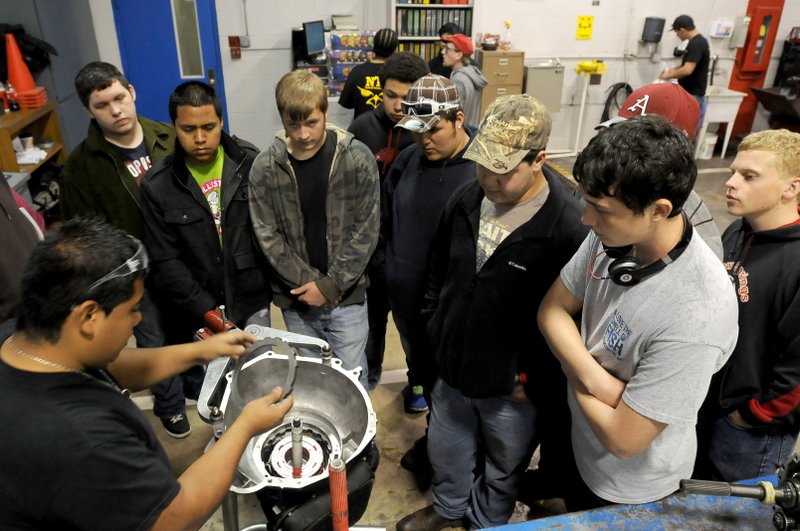Jobs in growing sectors have required more than a high school degree for a long time, said Kim Davis, director of education and workforce development for the Northwest Arkansas Council. The newer trend is that sectors growing the fastest don't always require a four-year degree, he said.
"We had 1,000 jobs open up in skilled trades in Northwest Arkansas last year: heating, air conditioning, ventilation, refrigeration, machine shop trades, welding, truck drivers, commercial vehicle operators. We had 87 'completers,' people who completed some sort of training in those fields and received certification for it," Davis said, citing research by the council from a variety of sources.
Northwest Arkansas has always been able to draw skilled workers to fill demands, but the lack of a "pipeline" to train people in those fields leaves young residents of the region behind, Davis said. Also, people who pick sites for new businesses have access to the same detailed numbers he can cite, he said.
"If they look at a number like that, 87 completers for 1,000 jobs, they might not even come here," he said. "You used to be able to say that you'd be willing to train a workforce if an employer would come. Now they look at numbers like this even before they look at your region." If such a number is too low, the company might decide to look somewhere else, he said.
"Health care is the fastest growing job sector in the country," Davis said. "We should support that, focus on that. How do we go about doing that? We're having to work pretty quickly here, and what we've realized is that there are a lot of what we call middle skill opportunities. Those require more than a high school diploma, but not a college degree."
Education institutions from public schools to higher education are responding to the need for job-oriented training. For example, the Pea Ridge School District obtained state Board of Education approval early this year to start the Pea Ridge Manufacturing and Business Academy, a charter school focused on trade skills that will cooperate with local businesses.
"This kind of school wouldn't even have been possible before the changes in the law in the last Legislative session" in 2013, Davis said. Higher education institutions are also responding to the need, said both Davis and Kathy Deck, director of the Center for Business and Economic Research at the University of Arkansas.
Charley Clark was named director of the new school at Pea Ridge on Feb. 10. He said the school will have five "pathways" picked for their demand in the local economy: logistics, health, sales, plastics and metal fabrication and industrial skills. At least one business in each field is helping the school district decide what classes to require, and the district hopes to recruit two local businesses for each field.
The school also is working with local colleges and technical schools to design courses and, if possible, obtain college credit for some courses, he said.
"Designing a curriculum is never actually going to end," Clark said. "We're going to be continually adapting, depending on what the economy needs." For instance, the "pathways" and the businesses involved in them can change as the economy does, he said.
Recent economic studies by Georgetown University show that nationwide "48 percent of the jobs opening are middle-skill jobs," Davis said.
Job figures from Northwest Arkansas show the same trend, Deck said. Jobs requiring a four-year college degree are rising, but so are jobs that don't, she said.
"The good news in Northwest Arkansas is that we are adding jobs across all sectors except information, which is media, broadly speaking, and that's not going down," Deck said. "All of our sectors are hitting on all cylinders."
More than 25 percent of the adult population in the region now has a college degree or better, a significant improvement in recent years, Deck said.
"The thing about educational attainment is that other regions are also increasing," she said. "Many of our peers, the areas we compare ourselves to, are 30 and 35 percent. We're catching up, but we're catching up slowly."
"There's also persistent poverty in Northwest Arkansas, with an increasing population of the working poor whose income doesn't support a family," Deck said. "Each sector of the economy has its low-wage sector."
NW News on 03/23/2014

